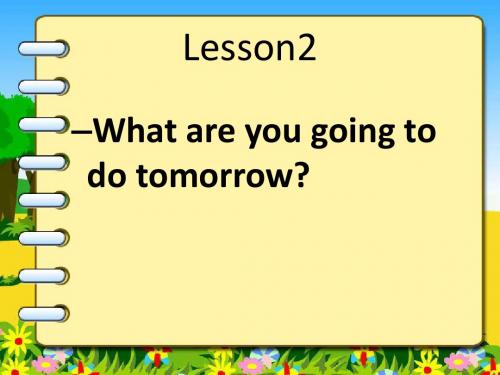科普版-英语-六年级上册-Lesson 2 What are you going to do tomorrow 教案
六年级英语上册Lesson2《Whatareyougoingtodotomorrow》 优秀课件科普版

2. -What are you going to do next Sunday? — I’m going to wash some clothes. — What’s he going to do? — He’s going to clean his room.
择决定命运,环境造就人生!
3. — What are you going to do after school? — I’m going to do sports. — What’s he going to do? — He’s going to play football.
1.-What are you going to do this Saturday? -I’m going to see a film.
1、只要有坚强的意志力,就自然而然地会有能耐、机灵和知识。2、你们应该培养对自己,对自己的力量的信心,百这种信心是靠克服障碍,培养意志和锻炼意志而获得的。 3、坚强的信念能赢得强者的心,并使他们变得更坚强。4、天行健,君子以自强不息。5、有百折不挠的信念的所支持的人的意志,比那些似乎是无敌的物质力量有更强大 的威力。6、永远没有人力可以击退一个坚决强毅的希望。7、意大利有一句谚语:对一个歌手的要求,首先是嗓子、嗓子和嗓子……我现在按照这一公式拙劣地摹仿为:对 一个要成为不负于高尔基所声称的那种“人”的要求,首先是意志、意志和意志。8、执着追求并从中得到最大快乐的人,才是成功者。9、三军可夺帅也,匹夫不可夺志也。 10、发现者,尤其是一个初出茅庐的年轻发现者,需要勇气才能无视他人的冷漠和怀疑,才能坚持自己发现的意志,并把研究继续下去。11、我的本质不是我的意志的结果, 相反,我的意志是我的本质的结果,因为我先有存在,后有意志,存在可以没有意志,但是没有存在就没有意志。12、公共的利益,人类的福利,可以使可憎的工作变为可 贵,只有开明人士才能知道克服困难所需要的热忱。13、立志用功如种树然,方其根芽,犹未有干;及其有干,尚未有枝;枝而后叶,叶而后花。14、意志的出现不是对愿 望的否定,而是把愿望合并和提升到一个更高的意识水平上。15、无论是美女的歌声,还是鬓狗的狂吠,无论是鳄鱼的眼泪,还是恶狼的嚎叫,都不会使我动摇。16、即使 遇到了不幸的灾难,已经开始了的事情决不放弃。17、最可怕的敌人,就是没有坚强的信念。18、既然我已经踏上这条道路,那么,任何东西都不应妨碍我沿着这条路走下 去。19、意志若是屈从,不论程度如何,它都帮助了暴力。20、有了坚定的意志,就等于给双脚添了一对翅膀。21、意志坚强,就会战胜恶运。22、只有刚强的人,才有神 圣的意志,凡是战斗的人,才能取得胜利。23、卓越的人的一大优点是:在不利和艰难的遭遇里百折不挠。24、疼痛的强度,同自然赋于人类的意志和刚度成正比。25、能 够岿然不动,坚持正见,度过难关的人是不多的。26、钢是在烈火和急剧冷却里锻炼出来的,所以才能坚硬和什么也不怕。我们的一代也是这样的在斗争中和可怕的考验中 锻炼出来的,学习了不在生活面前屈服。27、只要持续地努力,不懈地奋斗,就没有征服不了的东西。28、立志不坚,终不济事。29、功崇惟志,业广惟勤。30、一个崇高 的目标,只要不渝地追求,就会居为壮举;在它纯洁的目光里,一切美德必将胜利。31、书不记,熟读可记;义不精,细思可精;惟有志不立,直是无着力处。32、您得相 信,有志者事竟成。古人告诫说:“天国是努力进入的”。只有当勉为其难地一步步向它走去的时候,才必须勉为其难地一步步走下去,才必须勉为其难地去达到它。33、 告诉你使我达到目标的奥秘吧,我唯一的力量就是我的坚持精神。34、成大事不在于力量的大小,而在于能坚持多久。35、一个人所能做的就是做出好榜样,要有勇气在风 言风语的社会中坚定地高举伦理的信念。36、即使在把眼睛盯着大地的时候,那超群的目光仍然保持着凝视太阳的能力。37、你既然期望辉煌伟大的一生,那么就应该从今 天起,以毫不动摇的决心和坚定不移的信念,凭自己的智慧和毅力,去创造你和人类的快乐。38、一个有决心的人,将会找到他的道路。39、在希望与失望的决斗中,如果 你用勇气与坚决的双手紧握着,胜利必属于希望。40、富贵不能淫,贫贱不能移,威武不能屈。41、生活的道路一旦选定,就要勇敢地走到底,决不回头。42、生命里最重 要的事情是要有个远大的目标,并借助才能与坚持来完成它。43、事业常成于坚忍,毁于急躁。我在沙漠中曾亲眼看见,匆忙的旅人落在从容的后边;疾驰的骏马落在后头, 缓步的骆驼继续向前。44、有志者事竟成。45、穷且益坚,不坠青云之志。46、意志目标不在自然中存在,而在生命中蕴藏。47、坚持意志伟大的事业需要始终不渝的精神。 48、思想的形成,首先是意志的形成。49、谁有历经千辛万苦的意志,谁就能达到任何目的。50、不作什么决定的意志不是现实的意志;无性格的人从来不做出决定。我终 生的等待,换不来你刹那的凝眸。最美的不是下雨天,是曾与你躲过雨的屋檐。征服畏惧、建立自信的最快最确实的方法,就是去做你害怕的事,直到你获得成功的经验。 真正的爱,应该超越生命的长度、心灵的宽度、灵魂的深度。生活真象这杯浓酒,不经三番五次的提炼呵,就不会这样可口!人格的完善是本,财富的确立是末能力可以慢 慢锻炼,经验可以慢慢积累,热情不可以没有。不管什么东西,总是觉得,别人的比自己的好!只有经历过地狱般的折磨,才有征服天堂的力量。只有流过血的手指才能弹 出世间的绝唱。对时间的价值没有没有深切认识的人,决不会坚韧勤勉。第一个青春是上帝给的;第二个的青春是靠自己努力的。不要因为寂寞而恋爱,孤独是为了幸福而 等待。每天清晨,当我睁开眼睛,我告诉自己:我今天快乐或是不快乐,并非由我所遭遇的事情造成的,而应该取决于我自己。我可以自己选择事情的发展方向。昨日已逝,
科教版六年级英语上册Lesson2

film
listen to music
wash some clothes
clean his room
do sports
play football
do some shopping
看电影 做运动
buy some school things
see a film
listen to music wash some clothes clean his room do sports
What are you going to do tomorrow? Are you going to make a cake?
tomorrow this evening next Sunday after school
---What are you going to do this evening? ---I’m going to see a film.
买一些学习用品
买东西 踢足球 洗衣服 打扫他的房间
play football
听音乐
---What are you going to do tomorrow? ---I am going to do some shopping. ---What’s he going to do? ---He’s going to buy some school things.
---What’s he going to do?
---He’s going to buy some school things.
---What are you going to do next Sunday? ---I’m going to wash some clothes.
---What’s he going to do?
2017秋科普版英语六上Lesson 2《What are you going to do tomorrow》word教案

2017秋科普版英语六上Lesson 2《What are y ou going to do tomorrow》word教案语言目标:1. 学习一样今后时态的句型,明白得其含义,把握其用法。
What are you going to do tomorrow?We’re going to help mother do the housework.2. 明白得会讲会用会写有关家务劳动的单词Do the housework, clean the room, mop the floor, do the washing.情感目标:鼓舞学生助人为乐的行为。
教学重点和难点分析:1. 能够正确使用一样今后时态的差不多句型What are you going to do…? We are going to…句型表达将要做某事。
21世纪教育网版权所有2. 能够自如地运用有关家务劳动的词语表达将要感的家务事。
课前预备:教师预备录音机,磁带和单词卡片。
教学过程:1.热身(Warming up)通过教师和学生的对话引出本课的重点词汇和重点句型。
T:Tomorrow is Saturday. Do you want to play with me in Xingqing Park?S1: No, I can’t. I will be very busy tomorrow.T: What are you going to do tomorrow?S1: I’m going to do lots of housework.T: What kind of housework will you do?S1: I’ll clean the room. I’ll mop the floor and do the washing.T: You are really a nice boy.S1:Thank you. So what are you going to do?T: I’m not going to the park. I’ll do my homework. So I’m a nice boy, right.S1: Hahaha. ..You are a nice boy.2 . 新课展现(New Presentation)讲解人A和B讲解本课的重点词汇和重点句型。
科普版英语六年级上册课件-Book 6A Lesson 2-附教案

play football, this Sunday
Let’s learn
Let’s learn
—What are you going to do ...? —I’m going to ... —What is he going to do? —He is going to ...
Look and say
Let’s talk
♥ What are you going to do tomorrow? 你明天要去做什么? What are you going to buy? 你要去买什么?
What is he/she going to do tomorrow? What are they going to do tonight? Where are you going to play tonight? When are you going shopping?
Practices
MAKE DIALOGUES
Lele
Ann
buy some pens tomorrow
buy some bread tomorrow
go to the supermarket
Summary
Words
map, China, crayon
Sentence structures
* What are you/they going to do tomorrow? * What are you/they going to buy? * What is he/she going to do tomorrow? * —How can we get there? —By bike.
Lesson 2 What are you going to do tomorrow?
最新科普版六年级英语(上册)第2课

Every Saturday John goes to Mr Smith’s house and talk with him.“I’m going to clean my house tomorrow ”, or“I’m going to wash my car next week.”
Mr Smith usually says, “Are you, John?” John isn’t going to clean his house or wash his car. Mr Smith knows that.
4.It’s time for breakfast.
=It’s time to have breakfast.
Let‘s do, 用to或for填空。
1.It’s time __f_o_r__ lunch. 2. It’s time __t_o___ get up. 3. It’s time __t_o___ go to bed. 4. It’s time __t_o___ have supper. 5. It’s time __f_o_r__ class.
I'm going to do some shopping .
What are you going to buy?
I'm going to buy a map of China.
I want to buy some crayons. Can I go with you?
Sure
How can we get there? By bike,OK? OK.
It’s time for school. 该上学了。 It’s time for breakfast. 该吃早饭了。 It’s time for lunch. 该吃午饭了。
六年级上册英语-Lesson 2 明天你要做什么? 科普版

知识讲解
What are you going to do this weekend?
I’m going to…
ready for (something)
get (prepare for something)
some work done together with friends (meet friends)
Thanks and see you next time!
知识讲解
What are you going to do this weekend?
I’m going to…
a party
have some friends over
(invite friends to one’s home)
a barbeque (an outdoor meal/party at which food is cooked on a grill/over a fire)
Sure!
知识讲解
How can we get there?
OK.
By bike, OK?
知识讲解
What are you going to do tomorrow? I’m going to do some shopping. What’s he going to do? He’s going to buy some school things.
六年级(上册)
Lesson 2 明天你要做什么?
Warming up
Hi, everyone! What are you going to do tomorrow?
What are you going to do tomorrow?
六年级上册英语PPT课件Lesson 2 What are you going to do tomorrow 第一课时科普版18
He’s going to clean his room.
She’s going to do her homework.
>>Presentation
Listen and answer What is Dongdong going to do tomorrow? He is going to do some shopping.
go fishing swim
play the piano
>>Summary
“be going to +动词原形” 在特殊疑问句的应用:
1. ---What are you going to do tomorrow? ---I’m going to do some shopping.
2. ---What are you going to buy? ---I’m going to buy a map of China.
>>Lead-in
Look and say
crayon
Eg: I’m going to buy some beautiful crayons tomorrow.
>>Lead-in
Free talk
What are you going to do tomorrow?
>>Presentation
D: I’m going to buy a map of China.
>>Presentation Let’s talk
录音
课文句子
E: I want to buy some crayons. Can I go with you?
科普版-英语-六年级上册-Lesson2_单元教材分析
Lesson2 单元教材分析一、教学内容和要求(Teaching contents and demands)二、教学内容分析(Analyses of teaching contents)1. 词汇本课共出现了7个生词,其中5个单词在词汇表中是红色词,为四会单词。
要求学生做到能听懂、会说、能认读并能根据中文拼写出英文。
提醒学生China和Saturday的首字母要大写;son和sun是同音词。
never, another 是蓝色词,要求三会,即:能听懂、会说、会认。
在Let’s learn部分出现了八个日常生活中常用的动词短语:do some shopping,buy some school things,see a film,listen to music,wash some clothes,clean his room,do sports,play football 这些短语用于操练本课的语言结构,要求学生能听懂、会说并能指认即可。
2. Let’s talk本课的对话部分是伊芙和东东的对话场景。
东东打算去购物,伊芙也想和他一起去,东东爽快答应,并约好一起骑自行车去。
通过对话,引出谈论将来计划的交际用语What are you going to do…? I am going to…以及表示请求的问答Can I go with you? Sure!3. 语言结构本课的语言结构是What are you going to do...? I’m going to ... What’s he going to do? He’s going to...本课着重学习一般将来时“be going to+动词原形”结构的特殊疑问句的用法。
要求学生能够熟练应用,并且会做替换练习。
4. Read本课的阅读部分讲述的是有一位懒惰的先生,他总是说“我打算去做……”而却从来都不付诸行动,因此大家都称呼他为“打算去做先生”。
六年级上册英语课件-Lesson2《Whatareyougoingtodotomorrow》|科普版
2.-What are you going to do next month? -I’m going to learn to swim.
3.-What are you going to do this evening? -I’m going to watch TV.
4.-What are you going to do tomorrow? -I’m going to visit my friends.
1. — What are you going to do this evening? —I’m going to see a film. — What’s he going to do? — He’s going to listen to music.
2. -What are you going to do next Sunday? — I’m going to wash some clothes. — What’s he going to do? — He’s going to clean his room.
Let’s talk
Let’s learn
— What are you going to do tomorrow? — I’m going to do some shopping. — What’s he going to do? — He’s going to buy some school things.
3. — What are you going to do after school? — I’m going to do sports. — What’s he going to do? — He’s going to play football.
1.-What are you going to do this Saturday? -I’m going to see a film.
最新科普版小学英语六年级上册Lesson2What are you going to do tomorrow教案
Lesson 2 What are you going to dotomorrow?主备人:于露晨教学要求1、能听懂、会说、会认读,并能根据中文写出英文:map, China, crayon, Saturday, son。
只要求能听、说、认,不要求拼写:never, another。
2、能理解和掌握一般将来时“be going to +动词原形”结构各人称的特殊疑问句及其回答:What are you going to do tomorrow?I am going to do some shopping.What’s he going to do?He’s going to buy some school things.3、能听懂、会说,并能用来进行会话:If you say you are going to do something, then do it.4、能理解故事大意,并能根据回答与课文内容有关的问题及能根据图片和所给关键词复述。
Mr Going-to-do教学重难点1、单词的记忆。
2、一般将来时各人称的理解和应用。
教具准备多媒体课件教学时间四课时教学过程第一课时1、warm-up1) Free talk2) 复习第一课的单词。
2、Words1)听录音,默读单词2)讲解单词3)听录音,跟读单词4)男女生合作读单词5)齐读单词3、Let’s talk1)导入新课通过“去购物”的话题导入新课。
听录音,默读课文。
2)讲解课文3)男女生分角色读课文4)自读课文5)根据出示的关键词尝试分组复述课文6)全体学生根据关键词复述课文7)单个学生根据关键词复述课文作业布置两人一组练习对话,并准备表演。
板书设计map China crayon Saturday son第二课时1、复习检查:1)听写单词。
2)根据关键词复述课文。
3)两人一组表演对话。
2、Let’s learn:1)讲解出现的短语及生词。
2)根据句型进行替换练习,注意肯定句、否定句、一般疑问句及回答,每种句型都要有替换。
- 1、下载文档前请自行甄别文档内容的完整性,平台不提供额外的编辑、内容补充、找答案等附加服务。
- 2、"仅部分预览"的文档,不可在线预览部分如存在完整性等问题,可反馈申请退款(可完整预览的文档不适用该条件!)。
- 3、如文档侵犯您的权益,请联系客服反馈,我们会尽快为您处理(人工客服工作时间:9:00-18:30)。
Lesson 2 What are you going to do tomorrow?
教案
【教学目标】
1.知识目标:
(1)能听说读写单词:map, crayon, China, Saturday, never, another.
(2)理解掌握动词词组和时间短语:see a film, listen to music, clean room, play football, this evening, after school.
(3)能够听、说、认读句型以下并能对其中的动词和时间短语进行替换操练:
--What are you going to do tomorrow?
--I’m going to do some shopping.
2.情感目标:
(1)在情景创设中培养学生合作学习的能力。
(2)通过多种形式的游戏和活动,激发学生学习英语的兴趣。
(3)通过本课的学习教育学生合理安排自己的活动时间并能将计划付诸于实践。
【教学重点】
1. 掌握所学动词词组:see a film, listen to music, clean room, play football
2. 能在情境中替换going to do 句型中的动词词组和时间短语对将来的活动进行描述,并能与他人进行交流。
【教学难点】
1.能掌握本单元新单词及词组。
2.句型:
--What are you going to this Saturday?
--I’m going to see a film.
【教学过程】
Step 1 Warming up
1.教师课前播放歌曲What Are You Going to Do? 复习上一课所学的be going to do句型。
2.师生进行日常会话,可将重点放在动词短语的问答上,如:
T: What day is it tomorrow?
S: It’s weekend.
T: What do you usually do on weekend?
S: I usually read book.
点击课件,出现学生熟悉的活动场景,学习新单词和词组see a film, listen to music, clean room, play football等。
通过这样的方式引导学生进入新课的学习,既与实际相结合学习了新单词,又大大提高了学习兴趣。
Step 2 Presentation
1. Let’s talk
(1)看Let’s talk部分的教学内容。
让学生们说出对话中出现了什么人物,他们在谈论什么,提到了哪些内容?将有关生词和句型写到黑板上。
(2)简单讲解黑板上的生词和句型,教学生认读、跟读和记忆。
(3)通过多种形式让学生熟悉和掌握对话内容。
比如:角色扮演朗读。
T: What are you going to do tomorrow?
S1: I’m going to do some shopping.
T: What are you going to buy?
S1: I’m going to buy a map of China.
T: I want to buy some crayons. Can I go with you?
S1: Sure.
T: How can we get there?
S1: By bike, OK?
T: OK.
2. Let’s learn
(1)看Let’s learn的教学内容,浏览,了解大意和要求。
(2)两人一组,仿照课文提供的四副图片的内容进行对话练习,通过对话的方式掌握好本课句型。
--What are you going to do this evening?
--I’m going to see a film and listen to music.
--What’s he going to do next Sunday?
--He’s going to wash some clothes and clean his room.
3. Group work
多媒体呈现课文上的八张图片,要求同学们根据图片内容设计自己的计划,并向其他学生介绍自己的活动安排
如:
After school, I’m going to do my homework. I’m going to wash my clothes this evening. I’m going to play football with my friends tomorrow…
通过同学自己的设计展示,让学生掌握如何表达自己的安排计划。
Step 3 Practice
1.Listen and choose
(1)播放录音,完成Listen and choose部分的练习。
(2)学生展示汇报,并及时纠正所存在的问题。
2. Read
(1)阅读Read部分,理解大意,标出难以理解的地方。
(2)教师讲解说明一些难点。
(3)把全班分成5小组,理解大意,每组分别演练五个不同的场景。
Step 4 Homework
1.抄写本课新学的单词及词组。
2.学生课后对父母或朋友的近期活动进行采访,记录结果并录音,把文字及料以及录音材料交给教师。
